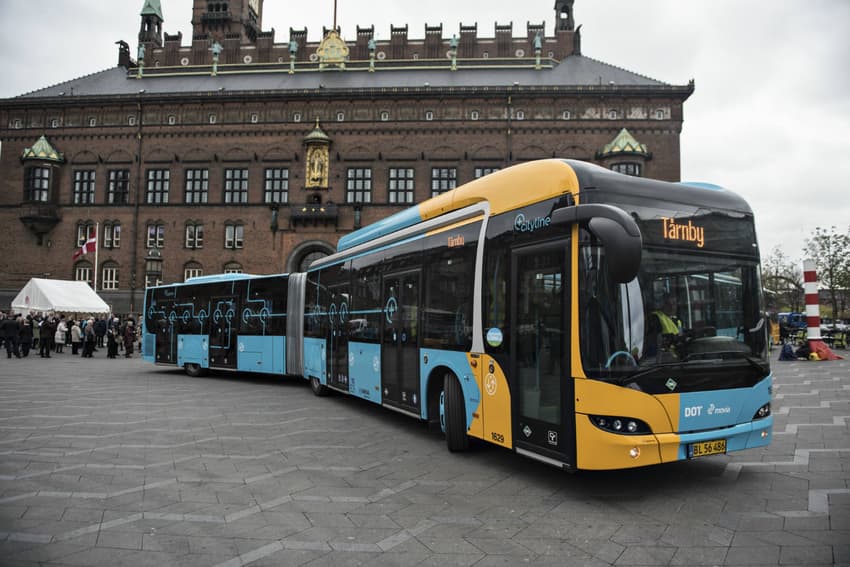Iconic Copenhagen bus service gets CO2 neutral replacement

The 5A bus, a Copenhagen institution that has ferried the city’s citizens across town for several decades, has been usurped by a greener, bluer replacement.
The route, which traverses the Danish capital from Husum Torv to Sundbyvester, is known for its packed insides and somewhat polluted trails. With several departures every hour throughout the day, the 5A plying its route is an almost ubiquitous sight in the city - until today.
Originally introduced as a tram line in 1903, route 5 now sees its long-running 5A buses replaced with newer, more eco-friendly models.

The new bus is launched 45 years to the day after the first diesel buses began to operate the number 5 route. Photo: Ida Guldbæk Arentsen/Scanpix
The all-change to the ageing line is made complete with a new letter – it now becomes the 5C – and extensions to its route.
The new buses, which are five metres longer than their predecessors, are CO2 neutral and run on biogases, reports newspaper Politiken.
READ ALSO: Copenhagen bans ’polluting’ buses
Nitrous oxide and particle omissions will be reduced significantly by the new buses.
Passengers will be able to use all five doors to enter and exit the bus, paying with Denmark’s Rejsekort prepayment system, and have space for 147 passengers – an increase of 82 compared with the old buses that will surely reduce the uncomfortable crowding on the line.
The 5A bus transported 20 million passengers last year, reports Politiken – only 6.6 million fewer than the total number of passengers passing through Copenhagen Airport in the same period.
A 24-hour service will also be introduced for the 5C, which will depart up to eight times per hour at peak times.

The 'eclectic' red leather seats of the old 5A have also bee upgraded to something a little lighter on the eye. Photo :Ida Guldbæk Arentsen/Scanpix
Comments
See Also
The route, which traverses the Danish capital from Husum Torv to Sundbyvester, is known for its packed insides and somewhat polluted trails. With several departures every hour throughout the day, the 5A plying its route is an almost ubiquitous sight in the city - until today.
Originally introduced as a tram line in 1903, route 5 now sees its long-running 5A buses replaced with newer, more eco-friendly models.

The new bus is launched 45 years to the day after the first diesel buses began to operate the number 5 route. Photo: Ida Guldbæk Arentsen/Scanpix
The all-change to the ageing line is made complete with a new letter – it now becomes the 5C – and extensions to its route.
The new buses, which are five metres longer than their predecessors, are CO2 neutral and run on biogases, reports newspaper Politiken.
READ ALSO: Copenhagen bans ’polluting’ buses
Nitrous oxide and particle omissions will be reduced significantly by the new buses.
Passengers will be able to use all five doors to enter and exit the bus, paying with Denmark’s Rejsekort prepayment system, and have space for 147 passengers – an increase of 82 compared with the old buses that will surely reduce the uncomfortable crowding on the line.
The 5A bus transported 20 million passengers last year, reports Politiken – only 6.6 million fewer than the total number of passengers passing through Copenhagen Airport in the same period.
A 24-hour service will also be introduced for the 5C, which will depart up to eight times per hour at peak times.

The 'eclectic' red leather seats of the old 5A have also bee upgraded to something a little lighter on the eye. Photo :Ida Guldbæk Arentsen/Scanpix
Join the conversation in our comments section below. Share your own views and experience and if you have a question or suggestion for our journalists then email us at [email protected].
Please keep comments civil, constructive and on topic – and make sure to read our terms of use before getting involved.
Please log in here to leave a comment.